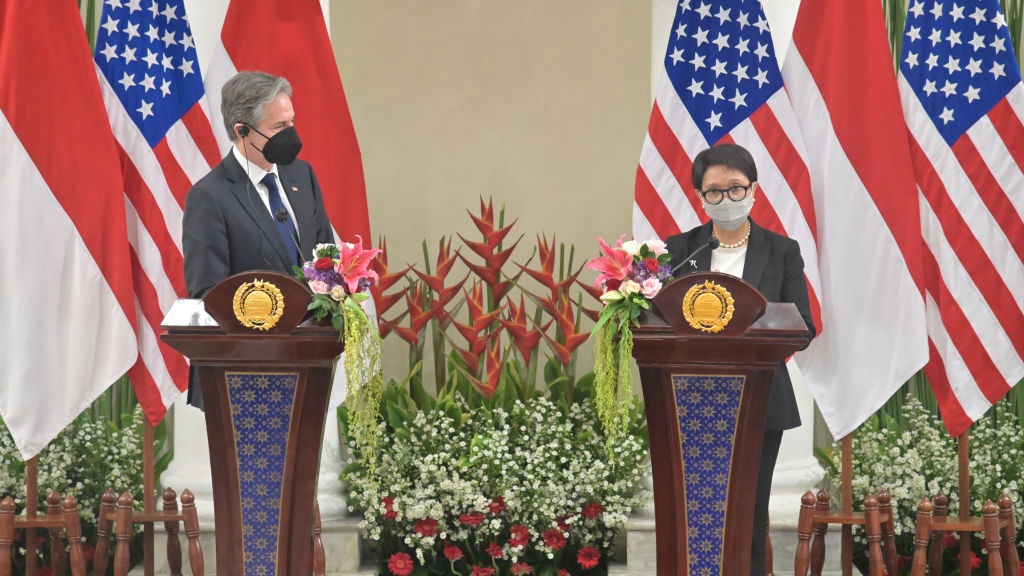
Indonesian Foreign Affairs Ministers Retno Marsudi (R) and U.S. Secretary State Antony Blinken (L) hold a joint press conference after their meeting at the Ministry of Foreign Affairs office in Jakarta, Indonesia, December 14, 2021. /Getty
Indonesian Foreign Affairs Ministers Retno Marsudi (R) and U.S. Secretary State Antony Blinken (L) hold a joint press conference after their meeting at the Ministry of Foreign Affairs office in Jakarta, Indonesia, December 14, 2021. /Getty
Editor's note: Andrew Korybko is a Moscow-based American political analyst. The article reflects the author's opinions and not necessarily those of CGTN.
U.S. Secretary of State Antony Blinken hinted on December 16 that America might try to assemble another Quad-like network in Asia. While speaking in Indonesia, the top U.S. diplomat said, "We will deepen our treaty alliances with Australia, Japan, Republic of Korea, the Philippines and Thailand. We will foster greater cooperation among these allies and seek ways to knit our allies together with our partners – as we have done with the Quad."
Its implied purpose would be to complicate China's relations with the region, as evidenced by him also saying that "there is so much concern from North East Asia to South East Asia, from the Mekong River to the Pacific Islands, about Beijing's aggressive actions."
Observers should note that Blinken didn't make any reference to South Asia or the U.S.'s Indian Quad partner, which might be due to its displeasure with that country's latest strategic partnership deal with Russia, following President Putin's visit last week.
New Delhi's commitment to the Quad's military component has become increasingly questionable after the whopping 99-paragraph Russian-Indian joint statement comprehensively covered their security cooperation up until 2030.
This came shortly after last month's successful Russia-India-China (RIC) Foreign Ministers virtual meeting. Considering the U.S.'s zero-sum perspective on international relations, it's therefore expected that it'll seek to recalibrate the Quad to concentrate more on treaty alliances.
Nevertheless, it also deserves mentioning that all of the concerned countries are part of last year's Regional Comprehensive Economic Partnership (RCEP) that was agreed to in November 2020, which is the world's largest trade bloc. Furthermore, last month's China-ASEAN Comprehensive Strategic Partnership also reaffirmed the closeness of Beijing's ties with each of that Southeast Asian bloc's members. Blinken's new Quad-like plot is therefore an attempt to divide and rule the broader region.
The Secretary of State's hostile claims against China upon which he hopes to build his country's new Quad-like structure, have no merit. He said that "we are determined to ensure freedom of navigation in the South China Sea, where Beijing's actions threaten the movement of commerce worth $3 trillion every year." That's not true since it's the U.S.'s dangerous naval provocations that it falsely describes as so-called "freedom of navigation operations" (FONOPs) that pose the greatest threat to commerce.

U.S. Secretary State Antony Blinken (2nd R) meets Indonesian Foreign Affairs Minister Retno Marsudi (not piscutred) at Indonesia's Ministry of Foreign Affairs office in Jakarta, Indonesia, December 14, 2021. /Getty
U.S. Secretary State Antony Blinken (2nd R) meets Indonesian Foreign Affairs Minister Retno Marsudi (not piscutred) at Indonesia's Ministry of Foreign Affairs office in Jakarta, Indonesia, December 14, 2021. /Getty
He's also partly wrong in declaring that "It is not a contest between a U.S.-centric region and a China-centric region." The "contest" (to use his terminology) does indeed involve a U.S.-centric region, but it's inaccurate to describe its alternative as a "China-centric" one. There's nothing "China-centric" about respecting the UN-enshrined legitimate "rules-based order", another phrase that the U.S. is so fond of using, but which it's recently perverted to describe its dangerous unilateralism across the world.
China strictly abides by the UN's rules-based order, in fact, so much so that the U.S. realized that it will gradually lose its hegemony the longer that time goes on unless it unilaterally changes the so-called "rules of the game".
This explains why it initiated the "Pivot to Asia" in 2011, after which it began stirring up trouble in the South China Sea around 2014 or so prior to former U.S. President Donald Trump waging his unprovoked trade and tech wars against China that his successor continued.
This month's falsely described "Summit of Democracy" was meant to artificially manufacture ideologically fault lines in what the U.S. considers its "new cold war" with "peer competitor" China, based on America's subjective criteria of what constitutes a "democracy". That very standard itself is paradoxically anti-democratic since it contradicts United Nations General Assembly Resolution 62/7 about the diversity of the world's democratic models.
That international legal document declares that "while democracies share common features, there is no single model of democracy and that democracy does not belong to any country or region, and reaffirm[s] further, the necessity of due respect for sovereignty, the right to self-determination and territorial integrity." Coupled with the insight about the South China Sea that was earlier shared, this confirms that the U.S.'s new Quad-like plot lacks any genuine security or ideological basis.
What Asia needs right now is closer coordination between its many countries, not more externally exacerbated divisions between them by self-interested third parties from halfway across the world like the U.S.
The new Quad-like network that Blinken hinted at during his speech in Indonesia is counterproductive, dangerous and doomed to fail. The countries that he proposed (included in that structure) should realize that they're being tricked into becoming the US.'s pawns, thus the need to reject its plans.
(If you want to contribute and have specific expertise, please contact us at opinions@cgtn.com.)

